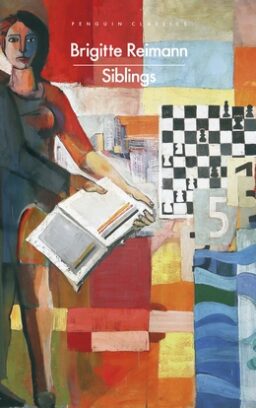You have no items in your cart. Want to get some nice things?
Go shopping
A classic of East German literature, Brigitte Reimann’s Siblings was first published in 1963. The novel centres on the lives of three siblings, Konrad, Elisabeth and Uli, torn apart by their different opinions and decisions regarding “Republikflucht,” literally “flight from the Republic.” Konrad, the older brother, deserted the German Democratic Republic (GDR) to go to the West a couple of years prior to the events that take place in the novel, and Uli is about to do the same. We follow Elisabeth as she navigates her own feelings about the two brothers: the memory of her last encounter with Konrad, and the fear of now losing a brother again. Lucy Jones, the translator of this new edition for Penguin Classics, presents us with a story whose drama is understandable only if read through the lens of its own time and the author’s personal life. Brigitte Reimann, one of the most acclaimed writers of the GDR, lived between 1933 and 1973. She wrote Siblings in her early 20s and, as a relatively young author, she imbued the novel with her convictions and enthusiasm for the work that her generation was doing: to rebuild a post-war Germany that was better than it ever had been before. This enthusiasm, which some might call naivety, coupled with the talent of the author, makes for a deeply captivating reading experience that turns back the clock.
Far from being a simple puppet of socialist propaganda, Reimann was a fervent believer in the socialist dream. For her, the GDR represented both the future and salvation of Germany, if not the world. In the novel, Elisabeth’s fear of being separated from her beloved brother Uli is familiar, ideological and political, probably as much as it was for Reimann herself, whose own brother defected. The spectre of Konrad’s betrayal taints Elisabeth’s judgement of her younger brother who, although much different in character and ideals, in her eyes morphs and becomes more and more similar to Konrad, the pushy elbow-man with the beautiful wife lured to the West by retail shoes and consumerism. To help her convince Uli to stay, Elisabeth asks her boyfriend Joachim, a Party member and a firm socialist, to intervene. While the two men talk behind closed doors, Elisabeth sits in the kitchen reminiscing about the past. We follow her erratic thoughts through memories of her childhood to more recent events, granting us a rare and genuine peek into life in the GDR. Through Elisabeth’s eyes the story of a country unfolds in only a few pages, from the early days of WWII to those of a well-established socialist regime that is already dealing with a generational divide.
The most captivating part of this novel has to be Elisabeth’s recollection of her and Uli’s childhood through the war years, which validates her need later on for a peaceful life, no matter the compromises the socialist regime asks of her. Reimann’s vivid descriptions of the GDR gathered her quite a following when Siblings was first published in the early 1960s. Many East Germans could see themselves represented in the many conflicts between Party loyalties and the longing for the freedom to pursue one’s own happiness and self-expression. Reimann’s pen perfectly captivates the emotional weight of living in the GDR and all its dilemmas: not everything can and should be political.
Elisabeth, as Reimann, is an artist and an academic who, as part of the Bitterfelder Weg program (1959-64), had to work a couple of days a week in a factory to experience another way of life dependent on manual labour. The program aimed at bridging the cultural gap between labourers and academics, proletariat and bourgeoisie. Elisabeth’s workdays at the plant lay bare many unsolved questions about the GDR’s future, the problematic relationship between normal citizens and Party-card holders, and lastly, the encrusted GDR power structures which showed its limits from the very outset.
The complex network of politics, changing times and personal struggles is handled with great care by the author. Reimann’s style reveals a romantic soul, as all her descriptions paint beautiful and poetic scenes that go beyond what meets the eye. The descriptions of the plant where Elisabeth works breathe life into the man-made landscape, exalted as one usually expects of more bucolic scenery. When the shadows in a Rembrant seem to bypass the confines of the painting and fall on Elisabeth’s mother’s face, it isn’t the simple play of light that we see, but rather the woman’s inner turmoil. Events and characters are presented by Reimann with an honesty uncommon for an author of the time. Any reader will easily recognise a brother, an uncle or a grandpa in the many men starring in Elisabeth’s life: the old rebel turned tireless handyman, the once-passionate student now disillusioned by a corrupt system, the cool-headed character who’s destined for greatness. Reimann goes as far as to reveal how the well-intentioned fall victim to the air of distrust that engulfed the GDR at that time, making it impossible for a simple man, or even a war hero, to enjoy an honest life. Things like fairness and justice were commodities to be exchanged among Party members who had managed to build a name that protected them and a narrative that went along with it.
Siblings’ storyline, however, takes drastic turns to sudden anti-defection campaigns, as political as they are problematic for a modern reader. An intense siblings’ fight, for example, becomes an excuse for a political rant, ending in the inevitable and sterile celebration of the socialist system as embodied by the GDR. If on one hand, the believable, fallible and human characters, as well as the recounting of the inner conflicts of the GDR are precise, clear and honest; on the other hand we also see a dramatisation of the then-contemporary anti-defection sentiment, certainly exasperated by the author’s feelings about the loss of her own brother to the West.
Given the many similarities between Elisabeth and Reimann, it’s interesting to point out that a modern reader might find Elisabeth a somewhat frustrating character. She appears almost to embody two women at once: a fierce young woman who strives to live independently and find her own way; and a girl whose opinion of herself and the world is validated only through the men in her life agreeing with her. Elisabeth’s changing mood and opinions make her a weak-minded character that often seems to be seeking outside approval rather than trusting her better judgement. The most frustrating consequence is that Elisabeth’s fervent, and at times inappropriate, love of her brother Uli turns to mistrust in the blink of an eye, as soon as she learns of his plans to leave. This is one of the many instances throughout the novel, where we see the split between the siblings becoming a metaphor for a split Germany. In Uli, the realisation that the socialist dream might not come true in the GDR brings a loss of confidence, whereas Elisabeth sees this loss of confidence as a loss of character on his part. What we’re actually witnessing is a different approach to socialism: the pragmatic one that accepts the existing system as “the best that we have,” and a more idealistic one that aspires to a more perfect and fair form of socialism yet to be built. While the first sees the GDR as a work in progress, the second sees it as a betrayal of the original dream. The siblings’ conflict is, yes, personal but shared by a whole generation. This is a real division existing not only under the GDR but even nowadays, that will leave readers to discuss these pages for weeks on end.
From a narrative perspective, however, Elisabeth’s outrageous reaction to her brother’s decision to leave is, as we said, out of character. We’re introduced to Elisabeth and Uli sharing an odd attachment, briefly but poignantly explained through the siblings’ childhood during the war, when they became everything to one another in difficult times. Moreover, Elisabeth is a deeply emotional woman, devoted to her brother, her love is even jealous and possessive. Hence, a reader might prefer to sympathise with Uli rather than Elisabeth when later in the novel he assumes the sister will help him escape, rather than call the Party (a.k.a. the police) on him. In this sense, Elisabeth isn’t dissimilar to a cultist and might reflect more the author’s depiction of the ideal East German woman, rather than the truth. That, above all, is what the reader will have to fight through the reading: a tentative representation of a sexually liberated woman whose values, however, ultimately revolve around her role as a sister, lover, and potential wife. That is ultimately the struggle of an early feminist, like Reimann herself. The misogyny is sprinkled throughout the novel but shamelessly reveals itself when Elisabeth’s sexual life is weaponised against her at work through gossip. Our main protagonist accepts it nonchalantly as part of life, and goes on challenging the rumours because they aren’t true, and not because even if they were true, it still wouldn’t be a topic to be discussed at work.
A lot more goes on in this relatively short novel. The impact of the fast-paced changes that occur during and after the war on the characters’ mental wellbeing goes unnamed — anything different would be anachronistic for a novel of the time —, however, we find hints at it everywhere. For example, when the siblings’ father returns from the war as an estranged man, whom they struggle to call “father,” but also when we are told the incredible pressure the siblings experienced in being taught to align with a one-sided perspective of the war, and the part their parents played in Nationalist Germany. The author’s pen was sharp and able to capture the nuanced reality of her time, yet the novel is undoubtedly and unavoidably tainted by socialist propaganda. The plot, events and conversations in Siblings portray socialist Germany as the future, capitalist Germany as the past; East Germans and anybody in the Eastern block as comrades and friends, West Germans and the rest of the world as enemies and foreigners. However, the honesty with which Reimann describes how both sides are hurt, traceable in all conversations between Elisabeth and Konrad, unveils the real-life dilemmas of the time. It’s astonishing that this novel made it through GDR censorship.
The incommunicability between believers in the socialist dream and those who chose to flee broke a country and tore families apart for generations, the consequences of which are still visible in Germany today. One hopes that the current younger generation will stop othering each other and thinking of themselves as split between East and West, but the problem is far from solved. Siblings isn’t necessarily an entertaining novel, but maybe entertainment shouldn’t be the reason to pick it up.
by Brigitte Reimann
Translated from the German by Lucy Jones
Penguin Classics, 144 pages

Francesca Ferrauto
Francesca Ferrauto‘s poetry, fiction, and essays have appeared in Gravitas, Beyond Words, From Whispers to Roars, Berlino Magazine, Il Mitte, and other journals. Born by the Mediterranean, she lived in London, Kyoto, and is now based in Berlin, where she is a Digital Editor, and a Communications Coordinator for SAND.
- Web |
- More Posts(3)




